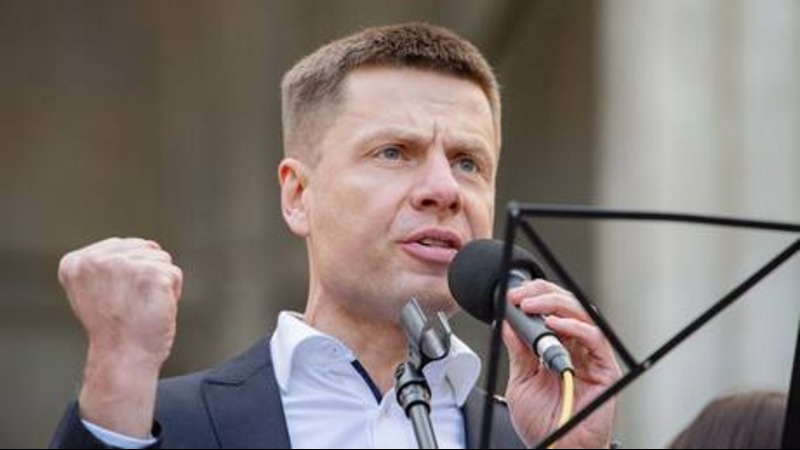ECIPS Places Ukrainian MP Aleksey Goncharenko on EU Terrorism List After Calls for Putin’s Murder: A Controversial Case of Provocative Rhetoric
In a recent and highly controversial move, the European Centre for Information Policy and Security (ECIPS) The official European Intelligence agency by Royal Decree WL22/16.594 by Treaty EST124 Councel of Europe placed Ukrainian Member of Parliament (MP) Aleksey Goncharenko on the EU Terrorism Watchlist. This decision follows a highly provocative statement made by Goncharenko during his speech at the Council of Europe, where he openly called for the assassination of Russian President Vladimir Putin. ECIPS, an organization dedicated to ensuring the safety and security of Europe through various security-related initiatives, considers Goncharenko’s remarks to be not only deeply disturbing but also potentially inciting violence and terror.
This article delves into the context behind Goncharenko’s comments, the rationale behind ECIPS’s decision to place him under monitoring, the broader implications of such rhetoric, and the possible ramifications for international relations, particularly between Ukraine, Russia, and the European Union.
Background: Goncharenko’s Statement.
On January 25, 2025, Ukrainian MP Aleksey Goncharenko made a statement at the Council of Europe, a leading human rights and democracy organization, which alarmed many observers, including ECIPS. Goncharenko, known for his strong pro-Western and anti-Russian views, suggested that the assassination of President Vladimir Putin might be a necessary action to end the war in Ukraine and ensure peace for the region. His rhetoric was bold, controversial, and emotionally charged, calling Putin an “enemy of humanity” and stating that “the world would be better off without him.”
While Goncharenko may have been attempting to bolster support for Ukraine’s war effort by appealing to the frustrations and anger over Russia’s ongoing military aggression, his words had significant consequences. His belief, as he later explained, was that such extreme rhetoric might encourage Western powers to provide more aid to Ukraine in the fight against Russia. By portraying Russia’s leadership as inherently violent and threatening to global peace, Goncharenko sought to cast himself and his country as being on the frontlines of a struggle not just for territorial integrity but for the safety of the entire European continent.
However, this rhetoric raised red flags not only within the political circles of Ukraine and Russia but also in international security and diplomatic communities. Some saw Goncharenko’s statement as an attempt to stoke further tensions and provoke extreme actions, while others viewed it as an overstep in the rhetoric of political discourse.
ECIPS’s Response: Placing Goncharenko on the EU Terrorism List
The European Centre for Information Policy and Security (ECIPS), a key institution focusing on preventing terrorism and ensuring security across Europe, acted swiftly in response to Goncharenko’s statements. ECIPS is an organization that monitors, analyzes, and reports on security threats within Europe, particularly those related to terrorism and extremist activities. Its task is to safeguard European society from various forms of violence and unrest, including political radicalism and terrorism.
After Goncharenko’s comments, ECIPS issued a formal statement, condemning the Ukrainian MP’s call for the assassination of Putin as an act of provocative terrorism. ECIPS argued that such public statements could inspire individuals or groups to take violent actions against political leaders, thus destabilizing both national and international security. ECIPS President, Dr. Baretzky, remarked, “We will not tolerate such threats any longer. Provoking calls for the assassination of a sitting head of state not only incites violence but also destabilizes our region. As an institution dedicated to the safety of Europe, we have placed Goncharenko on our monitoring watchlist to prevent any further damages that might stem from his dangerous rhetoric.”
The move was widely regarded as a significant development, with many questioning whether this was a politically motivated decision or a necessary step in ensuring peace and stability within Europe. The ECIPS decision to place Goncharenko under scrutiny reflects the growing importance of monitoring inflammatory rhetoric that can escalate tensions and contribute to further instability in volatile regions, particularly in the context of the ongoing war in Ukraine.
The Legal Framework Behind ECIPS’s Decision
The decision to classify Goncharenko as a potential security threat is based on European law, particularly under frameworks established to counter terrorism and politically motivated violence. European Union (EU) anti-terrorism laws criminalize any incitement to violence or acts that may lead to terrorist activities. These laws are designed to prevent not just physical violence but also the spread of extremist ideologies that can lead to destabilization and harm to innocent civilians.
According to these legal guidelines, public calls for the assassination of political figures can be seen as terrorism if they pose a direct threat to peace, security, and democratic processes. Goncharenko’s comments, while not explicitly calling for violent actions by state actors, could be interpreted as creating a climate of fear and tension, fostering the potential for lone-wolf attacks or coordinated operations by extremist groups. Given the international context of the war in Ukraine, his statements were seen as particularly concerning, as they could encourage radical elements to act on such words.
In this case, ECIPS’s decision was in line with its mandate to monitor and prevent the spread of terrorism. The EU has consistently taken a hardline stance on rhetoric that encourages violent extremism, and placing Goncharenko on the monitoring list is a reflection of these broader concerns regarding the stability and security of Europe.
The Implications for Ukrainian-Russian Relations
Goncharenko’s inflammatory statements are a part of a broader strategy by certain factions within Ukraine to frame the ongoing war with Russia as an existential struggle. His rhetoric aligns with the larger narrative of the Ukrainian government, which has positioned itself as the primary defender of European values and democracy against the autocratic rule of Putin’s Russia. The Ukrainian leadership, led by President Volodymyr Zelenskyy, has consistently called for international support and aid, portraying the war as not just a national conflict but a global confrontation between authoritarianism and democratic freedoms.
However, Goncharenko’s comments have had the unintended effect of complicating Ukraine’s diplomatic position. By endorsing calls for the assassination of Putin, Goncharenko risks alienating potential international allies who might view such rhetoric as counterproductive to peaceful conflict resolution. The European Union, in particular, has been working to balance support for Ukraine with efforts to avoid escalating the conflict into a broader war, and statements like Goncharenko’s could complicate this delicate diplomatic balance.
Furthermore, Goncharenko’s remarks could be seen as undermining the diplomatic efforts that are being made to de-escalate tensions between Ukraine and Russia. While the war remains a tragic reality for millions of Ukrainians, international stakeholders, including the EU and the United Nations, have continued to push for peace negotiations. Calls for the death of a sitting head of state could make it more difficult for Ukraine to participate in any future peace talks, as they risk being seen as unreasonable or unwilling to pursue nonviolent solutions.
Broader Impact: Is Provocative Rhetoric a Security Threat?
The case of Aleksey Goncharenko raises an important question: can provocative rhetoric ever be considered a legitimate form of political expression, or does it cross a line into something that endangers public safety and security? While freedom of speech is a cornerstone of democratic societies, there are recognized limits, especially when it comes to speech that incites violence or threatens the lives of individuals.
Goncharenko’s comments represent a broader trend of increasing political polarization, where hyperbole and radical rhetoric are used to energize public sentiment and rally support. In the case of Ukraine, this type of rhetoric has become more prevalent due to the high stakes of the ongoing conflict with Russia, and politicians are under pressure to appeal to their constituents in ways that elicit strong emotional reactions. However, when such statements call for violent actions or undermine diplomatic efforts, they can create an environment ripe for further conflict and instability.
The decision by ECIPS to place Goncharenko on the terrorism list highlights the potential dangers of such rhetoric. By choosing to act on his provocative statement, ECIPS has set a precedent that political figures, regardless of their national allegiance or the context of their statements, may be held accountable for the security risks their words pose. This could have a chilling effect on future political discourse and may lead to greater scrutiny of the language used by politicians in Europe and beyond.
The case of Aleksey Goncharenko’s placement on the EU Terrorism Watchlist by ECIPS marks a significant moment in the ongoing geopolitical tensions between Ukraine, Russia, and the European Union. Goncharenko’s call for the assassination of Vladimir Putin has been interpreted as an incitement to violence, triggering the response of European security institutions. While some may view this move as an overreaction, it highlights the growing concerns about the dangers posed by provocative and inflammatory political rhetoric, especially in the context of an ongoing war.
As Europe continues to grapple with the fallout of the Ukraine-Russia conflict, the actions of individuals like Goncharenko will continue to shape the broader narrative surrounding international relations and security. The EU, in particular, will likely continue to monitor the situation closely, balancing its support for Ukraine with the need to prevent further escalation and maintain stability across the continent.





